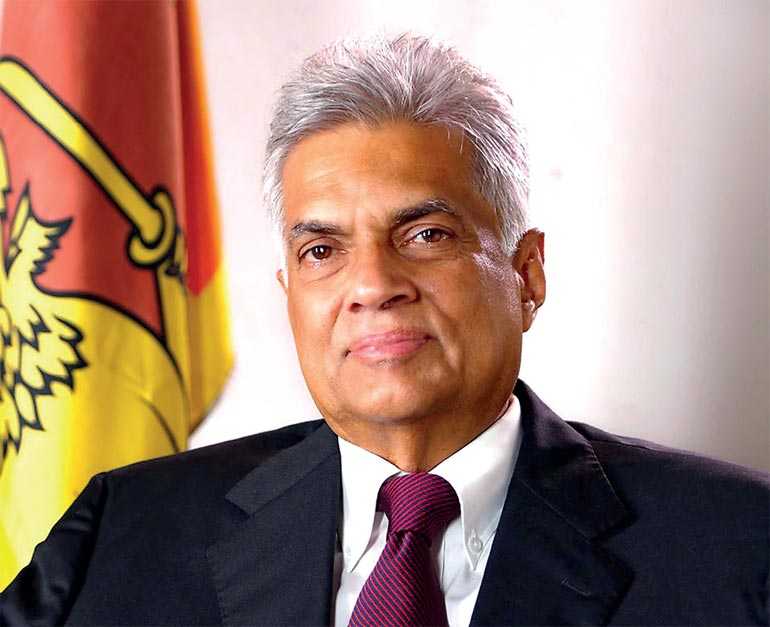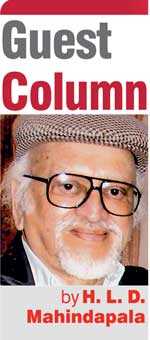Saturday Feb 07, 2026
Saturday Feb 07, 2026
Tuesday, 18 December 2018 00:00 - - {{hitsCtrl.values.hits}}

Last Thursday, just before the courts closed for Christmas holidays, the Supreme Court, sticking strictly to a legalistic path, put an end to the controversial issue of defining the powers of President Maithripala Sirisena, leaving the nation to wrestle with the bigger problems still awaiting solutions to stabilise the nation. In fact, the grim reality is that the decision of the Supreme Court has thrown the nation back to square one. If the President agrees to work with Ranil, the nation will be back to another stint of Ranil Wickremesinghe’s rule with all his “catchers” returning to lap the cream.
In the meantime, he can now claim Temple Trees as his legitimate political base. But that was a non-issue in any case, except for him. The nagging overarching question is more serious: what is he going to do with his powers to stay on, thanks to the Supreme Court, during the remaining period of his stewardship? He feels vindicated and strengthened by the Supreme Court decision. But, as things stand now, it is clear, that the more he consolidates his position the more he is likely to take the nation towards confrontation, tensions, uncertainties and instability.
Soon the issues of constitutionality will be forgotten and the usual blame game of party politics will take centre stage. UNP cabinet ministers will trek back to their seats claiming that democracy has being restored. NGOs and the Western embassies will be happy that their apparatchiks are back in the saddle. Paiki Saravanamuttu, Head of the Centre for Policy Alternative, and Prof. Ratnajeevan Hoole, two of the petitioners in the case, too will preen smugly broadcasting that their “citizenship rights” have been restored. (More about them later.) In short, will the return of Ranil take us out of the mess or drag us deeper into the depths that began with his regime staging biggest bank heist in the history of the nation in 2015 ?
One can also expect the cockiness of the UNPers to rise to a new level. There is no doubt that the “UNP’s arrogance and Prime Minister’s unilateral policy-making” (International Crisis Group report –16 May 2017) will generate more problems than solving the issues that cropped up in the post-Yahapalanaya regime. Besides, the political passions surrounding court case have polarised the nation. Ranil will resume his authoritarian role with a vengeance, tolerating no dissent. As usual he will misread the new situation and act as if he has got a new mandate to do what he wants. This is where he will slip and fall. 
He did not get a mandate from the Supreme Court to override the President nor to bulldoze his way through. Nor is it a personal victory for him, or an endorsement of his leadership. The Supreme Court decision was a mere legal clarification of the Presidential powers within the Constitution. This decision will return the political conditions to the status that existed before Parliament was dissolved. The final judgement is yet to made by the people. That will come when the election postponed by the Supreme Court will be held in 2020, or whenever.
In essence, what the Supreme Court did was to postpone the election that was gazetted to be held on 5 January 2019. In making its decision Supreme Court did what Ranil has done previously: postpone elections for another date. Postponing elections, under whatever pretext, does not make those evading elections ideal defenders or champions of democracy. His lapdogs in the NGOs, however, want us to believe that democracy is best served by postponing elections.
Paiki, for instance, asserts that his “citizenship rights” have been restored by the Supreme Court postponing the election gazetted by the President. Their latest political theory is tantamount to saying that denying, or postponing, the right to vote is a positive sign of the triumph of democracy. They argued in Court that holding an election before the scheduled time is a denial of their citizenship rights.
You begin to wonder whether Paki is just letting off high-pressure hot air from his mouth, hissing like a leaking car tyre, or delirious that the vast majority has been denied their right to express their will through the exercise of universal franchise. He is bound to claim that the postponing elections by the Supreme Court is a great victory for democracy and for his NGO. Example: Provincial Council elections have been postponed with no dated fixed for it. Has he gone to courts saying that his citizenship rights have been denied by Ranil Wickremesinghe not holding PC elections?
Of course, it is the duty of every citizen to safeguard the rights that come with citizenship. I am glad that two Tamils could go before an all-Sinhala judiciary and win their citizenship rights in the ‘Sinhala Only’ State. But what worries me is why these two Tamils, posing as defenders of human rights (Blah! Blah! Blah!) didn’t fight for the citizenship of his fellow-Tamils in the high court of Velupillai Prabhakaran who ran his one-man state with all the legal paraphernalia of courts, police, lawyers, judges, etc.
The TNA bigwigs, who are lawyers, also trooped into a Sinhala Only Court, draped in their black gowns, demanding their rights as citizens of Sri Lanka. But when did the TNA lawyers ever step into one of Prabhakaran’s court challenging the Tamil Pol Pot’s fascist regime that denied the Tamil people their inalienable right to protect their children being forcibly abducted to kill more Tamils than all other forces put together, as stated by S. Chandrahasan, son of S. J. V. Chelvanayakam?
An incorrigible tendency of the Tamil leadership has been to fight for democratic rights in the Sinhala South and defend with their lives the fascist tyranny of Tamil Pol Pots in the north. Democracy in the south and Tamil tyranny in north could never co-exist. One or the other had to go. And all peace-loving democrats should pay homage on their knees to our heroic soldiers who restored democracy for the oppressed, war-ravaged Tamils to enjoy the blessings of peace and freedom once again. The Tamils of the North are able to walk with dignity and respect because 29,000 Sinhala soldiers sacrificed their lives to liberate Jaffna from the Tamil Pol Pot.
I am digressing. Let’s get back Ranil in the post-Supreme Court decision period. Assuming that he has won a great personal victory he will now parade as the new champion of democracy. Just the other day he portrayed himself as the great discoverer of the fact that the Sri Lankan parliament has been governed by the Westminster tradition since 1948.
As everyone knows, one of the sacred tenets of the Westminster tradition is for a prime minister, minister, or an MP, caught red handed with corruption, deceit, lying to Parliament, or obstructing or misleading Parliament, etc., to resign immediately without even an inquiry. When has Ranil ever followed that exemplary principle?
A British Member of Parliament caught with the evidence revealed in the Bond Commission would have been hounded out of Parliament by the unbearable weight of public opinion alone. But his skin is more tough and leathery than that of a buffalo. He has sailed through the rough and tumble of politics by not talking through his mouth but through an aperture in his anatomy which is somewhere below his belt, as stated by his childhood friend Chandrika Kumaratunga.
Looming large in the days ahead will be his relationship with the President. He will front up as if he has got a legal warrant to extract as much power as he can from the President to push his anti-national agenda. Reconciliation between the two seems unlikely in the immediate future. Plagued by the strained relations both are likely to snipe at each other.
Ranil will insist on having his way. At every opportunity his parliamentary manoeuvres will be to fortify and expand his powers. He will pose as a pious pupil of Parliamentary procedure enshrined in the Westminster tradition. His fake commitment to Westminster traditions is exhibited unashamedly in appointing the TNA leader as the Leader of the Opposition who has only 16 MPs in a House of 225. His attempt to get away with lies claiming to be devotee of the Westminster model is childish and stupid.
His main tactic will be to put the blame from now on to the President and Mahinda Rajapaksa. But Anura Kumara Dissanayake has nailed this canard in Parliament. In blunt terms he accused Ranil of being responsible for the recent kerfuffle. The newspaper report captures the full extent of Ranil’s responsibility in causing the crisis. It said: “ The JVP yesterday (12 December), criticised UNP Leader Ranil Wickremesinghe, saying that it was he who created the platform for the political coup by President Maithripala Sirisena and former President Mahinda Rajapaksa.
“Participating in the debate, on the confidence motion in support of Wickremesinghe as the Prime Minister of Sri Lanka, JVP Leader Anura Kumara Dissanayake said that the current political turmoil was triggered as a result of Wickremesinghe and his Government shifting away from the mandate the public granted them in 2015.
“When a new Government was formed in 2015, there was a specialty in it. Several factions contributed to it. But unfortunately, one faction and a group of persons and a single authority started to claim the power. It is the Governing party which holds the responsibility for doing the correct thing.
“They are also responsible for not refraining from any wrong doing. But Wickremesinghe did not care about it. He allowed things, which were not supposed to take place, to happen.”
Dissanayake has also blamed the President and Mahinda Rajapaksa. But Ranil will be disappointed that he has not being exempted from blame. Also, being the skilled master of cover-ups, he will not accept his share of responsibility. He will come out swinging to confront the President, the opposition and any dissident that would dare to cross his path. He thinks he has risen from the ashes like phoenix.
One drama of Ranil is over.
What’s the next one?
Will the Western dip-low-mutts be invited by the Speaker to clap for the enactment of Ranil’s next theatrical performance in Parliament?